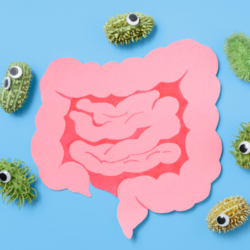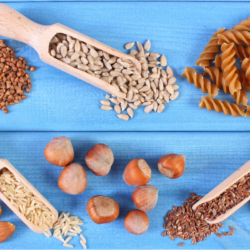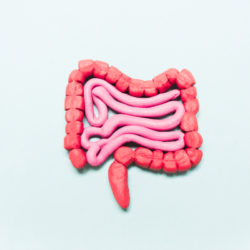Chronic constipation is a common health problem affecting many people around the world. The condition is characterised by infrequent, hard bowel movements, often causing pain and discomfort. In this article, we’ll explore the causes of chronic constipation, as well as natural and medical and medical remedies for dealing with it. We’ll also look at tips for preventing this health problem.
What causes chronic constipation?
In this section of the article, we’ll explore the mysteries of chronic constipation, a condition that affects many people around the world. By delving into the intricacies of this condition, we’ll discover the main causes of this persistent phenomenon. Chronic constipation is not just a temporary inconvenience; it can be a real ordeal for those who suffer from it on a daily basis. So what are the factors responsible?
Diet
One of the main causes of chronic constipation is a diet low in fibre. Fibre is essential for facilitating intestinal transit and preventing constipation. A diet high in processed foods, fats and sugars and low in fruit, vegetables and wholegrain cereals can lead to chronic constipation.
Lack of exercise
Lack of exercise can also contribute to chronic constipation. Physical exercise stimulates the intestinal muscles and encourages bowel movements. Sedentary people are therefore more likely to suffer from chronic constipation.
Medicines
Certain medications, such as antidepressants, calcium-based antacids, antihistamines and opioid analgesics, can cause or aggravate constipation.
Stress and depression
Stress and depression can also be contributing factors to chronic constipation. Stress affects the nervous system, which in turn can influence the functioning of the digestive system. Depression, on the other hand, can lead to a reduced appetite and less physical activity, which can encourage constipation.
What are the natural remedies to ease bowel movements?
Intestinal transit can be disrupted by various factors such as diet, stress and lack of exercise, leading to problems such as constipation. Fortunately, there are many natural remedies to ease transit and improve digestive health. In this section, we’ll explore these gentle, natural solutions to help you regain regular, comfortable bowel movements.
Drink enough water
Drinking enough water is essential to avoid chronic constipation. Water helps to soften stools and facilitates their passage through the colon. Make sure you drink at least 1.5 to 2 litres of water a day, increasing gradually if necessary.
Add fibre to your diet
To combat chronic constipation, it’s important to eat a diet rich in fibre. Fibre helps to increase the volume of stools and make them easier to pass. Eat more fruit, vegetables, legumes and wholegrain cereals to increase your fibre intake.
Do some exercise
Regular physical activity stimulates the intestinal muscles and encourages bowel movements. Try incorporating exercises such as walking, cycling, swimming or yoga into your daily routine to help prevent and relieve chronic constipation.
Managing stress
Learn how to manage stress can help reduce chronic constipation. Try relaxation techniques such as meditation, yoga or deep breathing to help reduce your stress levels. You can also consult a mental health professional for help and advice.
Can Kefir and Kombucha relieve constipation?
Kefir and kombucha are two types of fermented beverages that are often praised for their potential benefits for intestinal health. These benefits are mainly attributed to their content of probiotics, which are beneficial bacteria that can contribute to intestinal health.
Chronic constipation is a common disorder of the digestive system that can have many causes, including lack of dietary fibre, lack of exercise, dehydration, changes in daily habits or routines, certain diseases or medical conditions and the use of certain medications.
Studies have suggested that probiotics can help improve constipation by increasing stool frequency, improving stool consistency and reducing bowel transit time. For example, a systematic review and meta-analysis of 14 randomised controlled trials published in theAmerican Journal of Clinical Nutrition in 2014 concluded that probiotics can improve stool consistency and bowel transit time in people with constipation.
Kefir and kombucha contain probiotics, as well as other beneficial compounds, such as organic acids, which may also have a beneficial effect on digestion. However, it is important to note that the effect of these drinks on constipation may vary from person to person, depending on factors such as the underlying cause of constipation, the individual composition of the gut microbiome and the individual response to these drinks.
In addition, although kefir and kombucha are generally considered safe for most people, they can cause side effects in some people, such as bloating, nausea, allergic reactions and, in rare cases, infections. It is therefore advisable to start with small quantities and gradually increase consumption, and to consult a health professional if side effects occur or if you have any concerns.
Finally, it’s also important to stress that, although kefir and kombucha can potentially help improve constipation, they should not be used as a replacement for a balanced diet, adequate hydration and regular exercise, which are the main strategies for managing constipation.
How can chronic constipation be prevented?
To prevent chronic constipation, adopt a healthy lifestyle by maintaining a balanced diet, taking regular exercise and managing your stress. Make sure you drink enough water and listen to your body’s signals by going to the toilet as soon as you feel the need. Avoid eating too many processed foods rich in fats and sugars, and opt instead for natural foods rich in fibre or dietary supplements for transit.
Should I eat more fibre?
Fibre is known to aid transit. Because it is poorly absorbed in the small intestine, it increases the frequency of bowel movements by improving their consistency. It also encourages water to enter the colon through fermentation by the bacteria in the intestinal flora. However, this fermentation can be the cause of various discomforts such as bloating and gas. To avoid this, specialists recommend taking soluble fibres such as psyllium. In terms of consumption, it is recommended that you take 25 to 35 grams of fibre every day. You can ingest these by choosing fibre-rich foods such as dried fruit, wholegrain cereals, pulses and fresh fruit and vegetables.
Why do we need to drink regularly?
Lack of water or dehydration can also be the cause of chronic constipation. Because the intestine and food are not sufficiently hydrated, stools dry out and harden in the digestive tract. This causes difficulty in evacuation. It is therefore strongly recommended that you drink at least 1.5 litres of water a day, excluding physical activity. In addition, choose mineral waters, especially those rich in magnesium.
Can physical exercise relieve constipation?
Regular exercise also helps to reduce the symptoms of constipation. Why should you do this? Firstly, you hydrate continuously and abundantly to compensate for the water lost through sweating. As explained above, this improves transit. Secondly, the movements (especially abdominal movements) you make during exercise encourage the intestines to contract. This also facilitates the evacuation of stools, which are “softened” by the repetitive movements.
Should I take laxatives for constipation?
If the symptoms do not go away after a while, it is advisable to consult a doctor. Depending on the signs you are experiencing, he or she will be able to prescribe the right laxative for you. There are various types of laxative on the market:
- Ballast laxatives (mucilage) and osmotic laxatives, which hydrate the stools;
- Lubricating laxatives (emollients), which are paraffin-based and help the stool to slide and soften;
- Stimulant laxatives which stimulate colonic motricity and water secretion by the colonic mucosa. NB: they may cause abdominal pain and diarrhoea.
In all cases, if chronic constipation worsens and becomes increasingly painful, it is essential to see a professional. He or she can prescribe more extensive treatment depending on the severity of the situation: enema, re-education or even surgery.
Can chronic constipation lead to anal fissures?
Chronic constipation is frequently linked to anal fissures, an important subject in the field of natural remedies that your specialist online pharmacy explores. When bowel movements become difficult as a result of constipation, this can lead to increased pressure on the anal region during bowel movements. This excessive pressure can lead to the formation of fissures in the anal mucosa, establishing a clear link between chronic constipation and anal fissures. To alleviate these problems, there are a number of natural approaches available, such as increasing dietary fibre intake, ensuring adequate hydration, and using herbal remedies to promote smoother, more regular bowel movements. However, it is imperative to consult a healthcare professional before initiating any treatment, to ensure that it is suitable for each individual.
FAQ
1. How long does it take to see an improvement after changing one’s diet and lifestyle?
This depends on the individual and the severity of the chronic constipation. Some people may notice an improvement within a few days, while others may take several weeks to feel the effects of the changes.
2. Can probiotics help relieve chronic constipation?
Probiotics, which are beneficial bacteria found in certain foods and supplements, can help restore the balance of intestinal flora and thus improve bowel movements. However, studies into the effectiveness of probiotics in the treatment of chronic constipation are limited, and the results show inter-individual variability.
3. Can chronic constipation cause other health problems?
Yes, chronic constipation can lead to other health problems, such as haemorrhoids, anal fissures and faecal impaction. It is important to treat chronic constipation to avoid these complications.
4. When should I consult a doctor about chronic constipation?
If you are suffering from chronic constipation that is not relieved by natural remedies, if you notice blood in your stools, if you experience unexplained weight loss or if you experience intense abdominal pain, it is advisable to consult a doctor.
- Source:
https://www.snfge.org/sites/default/files/SNFGE/Bibliotheque_scientifique/dietetique_sur_la_constipation-snfge-cregg_2017.pdf - https://www.snfge.org/content/constipation-chronique
- https://www.cregg.org/fiches-recommandations/constipation/
- Dimidi E, Christodoulides S, Scott SM, Whelan K. The effect of probiotics on functional constipation in adults: a systematic review and meta-analysis of randomized controlled trials. Am J Clin Nutr. 2014;100(4):1075-1084. doi:10.3945/ajcn.114.089151







